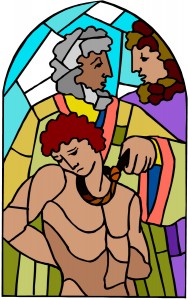Judah Approaches Joseph (Gen 44:18)
Judah came near to Joseph willing to lay down his life for his younger brother (Gen 44:18–34). This is another prophetic picture of the future Messiah who would come to this earth in willingness to give his life as a ransom to save his brothers. The Scriptures call Yeshua the “Lion of the tribe of Judah” (Rev 5:5) who initiated the process in seeking to save his brothers who were spiritually lost (Rom 5:8; Luke 19:10; Matt 18:11; ), and who Yeshua referred to as the lost sheep of the house of Israel (Matt 10:6; 15:24).
Joseph Had to Reveal Himself (Gen 45)
The brothers didn’t recognize Joseph because he resembled an Egyptian; he had to reveal himself to them. Today, Christians (the descendants of Joseph according to Gen 48:16, 18 and Rom 9:24–27 and the descendants of Abraham according Eph 2:11–19; Gal 3:7, 14, 28, 29), are revealing themselves to their brother Judah through several ways:
- Through donating money to Jewish relief agencies.
- Through Christian tourism of Israel.
- Through Christian interfaith organizations (Bridges for Peace, Christians United for Israel, Christian Friends of Israel, etc.).
- Through the Messianic Jewish Movement
- Through the Messianic Israel Movement.
- Through America’s (and Britain’s) military, political and economic support of the nation of Israel.
Two Messiahs in One Story
Judah and his brothers didn’t recognize Joseph; he had to reveal himself to them (Gen 45:1–4). They were “blinded” to who Joseph was. Most of Judah has spiritual blindness to this day (Rom 11:25). They are largely blind to Yeshua the Messiah, son of Joseph, and to the fact that Christians (many of whom are the descendants of Abraham through Joseph) are their long lost brothers. So in our story, Judah plays a dual role: that of spiritually blind Judah and that of the Messiah, the Lion of the tribe of Judah. His former role is prophetically emblematic of the Jewish nation including the modern Jews who have been largely blind to their Messiah (the Son of Joseph), and in the latter role as Yeshua the Messiah who was willing to lay down his life to save his brothers.
Even as Judah was a prophetic antitype of the Jewish people and the Jewish Messiah, likewise Joseph also fulfilled an antitypical role of the Messiah. He too was the spiritual father of his people—Ephraim and Manasseh—the dominate tribes of the Northern Kingdom of Israel who went into apostasy and become as “lost sheep” among the nations of the world (Hos 7:8; 8:8; Ezek 34:16 and numerous other scriptures). Therefore, Joseph prophetically represents the “lost sheep of the House of Israel” and the Messiah who would come and seek out those sheep.
The Jewish sages have seen a prophetic picture of the coming Messiah Son of Joseph, the Suffering Servant in the story of Joseph. They have written about the Suffering Servant, a Messiah Son of Joseph figure, who they felt would be a descendant of Ephraim and who would come to redeem the lost sheep or exiles of the House of Israel in preparation for a second Messiah to come. They refer to him as the Conquering King or Messiah the Son of David. Although I have found no instances where they also identify Judah with the coming Messiah, it is not hard to see some allusions to this in the interplay between Joseph and Judah. Let’s note what the sages write about Joseph as well as the descendants of his grandsons, Ephraim and Manasseh. Notice the striking similarities between modern Christians and those the Jewish sages viewed would be the followers of Messiah Son of Joseph?
What kind of blessing was this prediction that one day [Jacob’s] descendants—the Ten Tribes—would be scattered among the nations? R. Munk explains: while it is true that the dispersion was caused by the unfaithfulness and sinfulness of Ephraim’s descendants (Hos 7:8ff), Jacob’s blessing was not in vain for “they will return to God” and will have their share in the world to come ([Talmud] Sanhedrin 110b). And R. Eliezer adds: ‘Even the darkness in which the Ten Tribes were lost will one day become as radiant as the day’ (according to the version of Avos d’Rabbi Nosson 36). And in the perspective of history, did not these exiled children of the Patriarchs enlighten the nations among whom they were scattered? They did so by teaching their conquerors the fundamental ideas of the knowledge and love of God, ideals they had never forsaken. Hence they too have a messianic vocation and their Messiah the … Messiah son of Joseph (Succah 52a), also called Messiah son of Ephraim (Targum Yonasan on Exodus 40:11), will play an essential role in humanity’s redemption, for he will be the precursor of the … Messiah Son of David…. (emphasis added, note bolded part).



